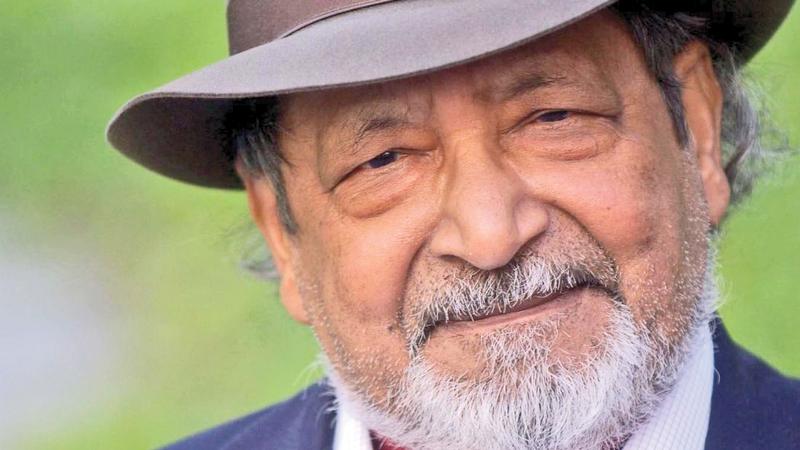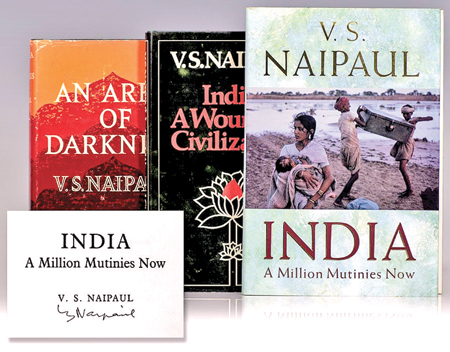
Vidiadhar Surajprasad Naipaul or V.S. Naipaul was born on August 17, 1932 in Chaguanas, Trinidad, where his ancestors had emigrated from India. In fact, his maternal grandfather had travelled from India to Trinidad as an indentured servant at the turn of the century. Though he was from a poor family, thanks to his brightness as a student, he could win a scholarship to Oxford University. So, after moving to London, he became an intellectual, and also a writer.
As he recounts, he wanted to become a writer right from his childhood days. Yet, his first two attempts in writing a novel were failed. At the third attempt, he finished it, ‘Miguel Street’, in 1955. But the novel wasn’t published until 1959. Then, he wrote ‘The Mystic Masseur’ in 1957, and it won the John Llewellyn Rhys Memorial Prize. Next, his third novel, ‘The Suffrage of Elvira’ appeared in 1958, which won the Somerset Maugham Award. The fourth novel, ‘A House of Mr. Biswas’, was published in 1961, and the fifth novel, ‘In a Free State’, published in 1971, received the Booker Prize. Since then, four novels have appeared: ‘Guerrillas’ (1975), ‘A Bend in the River’ (1979), ‘The Enigma of Arrival’ (1987) and ‘A Way in the World’. Considering all these, in 1990, he received a knighthood from the queen.
His art of fiction is best described in a Paris Review interview which was conducted by Jonathan Rosen and Tarun Tejpal in 1994. Following are quotes from the interview. Naipaul won the Nobel Prize for literature in 2001:
Inventing a close character
Generally, a writer explores himself when writing, because writing is an inner dialogue of the writer. But how does Naipaul deal with this?
 “Whenever I have had to write fiction, I’ve always had to invent a character who roughly has my background. I thought for many years how to deal with this problem. The answer was to face it boldly — not to create a bogus character but to create, as it were, stages in one’s evolution.”
“Whenever I have had to write fiction, I’ve always had to invent a character who roughly has my background. I thought for many years how to deal with this problem. The answer was to face it boldly — not to create a bogus character but to create, as it were, stages in one’s evolution.”
Thinking about the book
“I am always thinking about the book. You are writing a book: to satisfy that need, to make a living, to leave a fair record behind, to alter what you think is incomplete and make it good. I am not a spokesman for anybody. I don’t think anybody would want me to be a spokesman.”
I hate university degrees and its ideas
Generally, Naipaul detests university education, though he is a graduate from Oxford University.
“Actually, I hated Oxford. I hate those degrees and I hate all those ideas of universities. I was far too well prepared for it. I was far more intelligent than most of the people in my college or in my course. I am not boasting, you know well — time has proved all these things. In a way, I had prepared too much for the outer world; there was a kind of solitude and despair, really, at Oxford. I wouldn’t wish for anyone to go through it.”
Striving after a deeper understanding
Is writing a noble calling? According to Naipaul it is:
“Yes, for me it (writing) is the only noble calling. It is noble because it deals with the truth. You have to look for ways of dealing with your experience. You have to understand it and you have to understand the world. Writing is a constant striving after a deeper understanding. That is pretty noble.”
I write slowly
How is Naipaul’s way of writing?
“I write slowly…. I used to write faster when I was younger—about one thousand words a day when I was really going. I can’t do that now. Now, on a good day, I write about three hundred words — very little.”
But there are unproductive days as well: “Very often. Most days are like that.”
Hemingway called a day he had not written a day closer to death. To this Naipaul said: “I’m not romantic like that. I just feel rather irritated. But I’m wise enough now and experienced enough to know that it will be alright. If it’s in my head, it’ll come out all right eventually. It’s just finding the right way.”
I wish my prose to be transparent
“I wish my prose to be transparent — I don’t want the reader to stumble over me; I want him to look through what I’m saying to what I’m describing. I don’t want him ever to say, Oh, goodness, how nicely written this is. That would be a failure.”
Words are valuable
“… as a writer, you can become very lazy. You can start using words lazily. I don’t want that to happen. Words are valuable. I like to use them in a valuable way.”
Let the form take its own course
What does it mean to be a writer?
“…. to be a writer is to be observing, to be feeling and to be sensitive all the time. To be a serious writer is not to do what you have done before, to move on. I felt the need to move on. I felt I couldn’t do what I had done before — I shouldn’t just stay at home and pretend to be writing novels. I should move and travel and explore my world—and let the form take its own natural course.”
Writing is a process of inquiry and learning
“If you are a French or an English writer, you are born to a great knowledge of your origins and your culture. When you are born like me, in an agricultural colony far away, you have to learn everything. The writing has been a process of inquiry and learning for me.”
My kind of writing tries to find a spring
Naipaul’s novel ‘An Area of Darkness’ suggests a lot of anger. Therefore, one might wonder that anger works better than understanding for a writer.
“I don’t like to think of it as journalism — journalism is news, an event that is important today. My kind of writing tries to find a spring, the motives of societies and cultures, especially in India. This is not journalism. Let me correct that — it is not something that anybody can do. It’s a more profound gift. I’m not competing with journalists.”
But does anger work better than understanding?
“I think it isn’t strictly anger alone. It is a deep emotion. Without that deep emotion there is almost no writing — then you do journalism. When you are deeply churned up, you know that you cannot express this naked raw emotion; you have to come to some resolution about it. It is this refinement of emotion, what you call understanding, that really makes the writing. These two things are not opposed to one another—understanding derives from what you call anger. I would call it emotion, deep emotion. Emotion is necessary to writing.”
A prose book is a lot of work
Naipaul was a writer who had a long career in writing. About prose writing he has an opinion like this:
“A prose book contains many thousands of sentiments, observations, thoughts—it is a lot of work. The pattern for most people is to do a little thing about their own lives. My career has been different. I found more and more to write. If I had the strength, I probably would do more; there is always more to write about. I just don’t have the energy, the physical capacity. You know, one can spend so many days now being physically wretched. I’m aging badly. I’ve given so much to this career for so long. I spend so much time trying to feel well. One becomes worn out by living, by writing, by thinking.”
